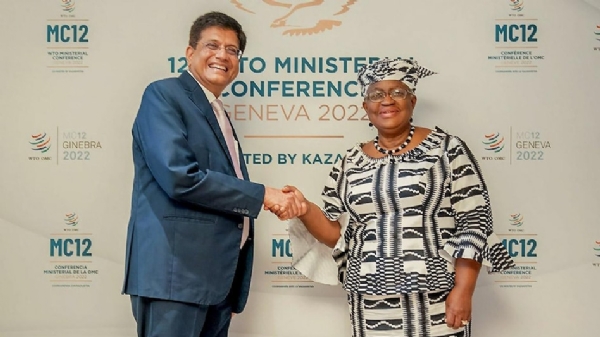WTO failed to respond during pandemic and food shortage: Piyush Goyal
13 Jun 2022 15:45:00
Geneva, Jun 13: India criticized the World Trade Organization (WTO), particularly rich countries, accusing them of not doing enough to tackle the crises brought on by the pandemic and rising food prices, which put millions of people in poor nations at the risk of starvation.

Union commerce minister Piyush Goyal made the remark while representing India at the plenary session of the Twelfth Ministerial Conference (MC12) of the WTO on Sunday, where he urged members to help the least developed countries (LDCs) recover from the pandemic and access foodgrain supplies that have undergone high global inflation because of the war in Ukraine.
“The pandemic reinforced the importance of ‘One Earth One Health’, calling for global solidarity and collective action,” he said, referring to India’s effort in ramping up supplies of medical products globally and providing Covid-essential items, including vaccines, to several countries. “Unfortunately, the WTO could not respond with alacrity. We have let down the people of the LDCs and developing countries. The rich countries need to introspect! We need to bow our heads in shame for our inability to respond to the pandemic in time,” he said in his address. Goyal drew the attention of the multilateral forum to the humanitarian crisis triggered by spiraling food inflation and called it a “matter of deep concern”, while also underscoring the importance of nurturing domestic capacities to produce food. “Rising food prices threaten the survival of millions and subjugate the poor and vulnerable nations/people to imperfect markets,” he said. India, which is supporting its 800 million poor through food security programs such as the ₹3.4-crore scheme under the Prime Minister Garib Kalyan Ann Yojana (PMGKAY), reiterated the need to have public procurement of food stocks by offering minimum support price (MSP) to farmers.
“After the Bali Ministerial Decision in 2013, the General Council in 2014 mandated permanent solution on the issue of public food stocks, which has already been delayed, should be the topmost priority for MC12, before we move to new areas. Nothing is more important than this for the people of the world,” he said. The public food stocks issue stems from the WTO’s restrictions on subsidies the government can provide, a restriction that was meant to ensure markets remain competitive globally. But economic inequities have complicated this arrangement, especially for developing countries. “Our collective moral obligation is to ensure that no person, anywhere in the world, goes to bed hungry and WTO rules should facilitate this. The Covid-19 pandemic has reinforced once again the need and efficacy of food stockholding for the public good,” he said.
India’s stand on this matter is backed by the G33, a group of 47 developing and least developed countries. Separately, addressing the G33, Goyal urged them to work collectively to get a fair, balanced, and development-centric outcome at the WTO that must also include a permanent solution for the public stockholding.